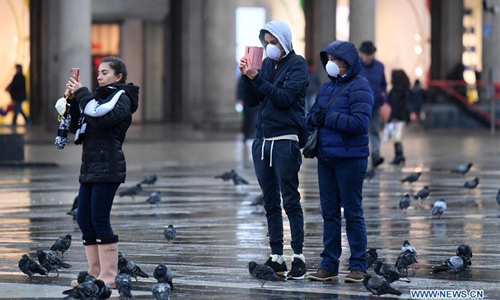Europeans reconsider wearing masks
By GT staff reporters Source:Global Times Published: 2020/3/10 0:08:40
Soaring number of infections ‘reduces continent’s previous prejudice’

Pedestrians wearing face masks are seen on the street in Milan, Italy, March 2. Photo:Xinhua
Some Europeans, especially those from coronavirus-stricken Italy, are finally ready to forego their previous prejudice against wearing masks amid soaring numbers of confirmed infections and deaths in Europe.
Although European countries believed some medical protective materials, especially masks, were not that nessesary for preventing the virus, these countries are now struggling with the supply of these materials as the demand is rising.
Walking past landmark Duomo square in central Milan after the Italian government ordered a lockdown on Sunday, local resident Davide Scirocco finally saw some people wearing masks as they fed pigeons. "After the lockdown, we saw empty streets and fear. But there is hope as many have come to realize the importance of self-protection, like wearing masks," Scirocco told the Global Times.
He said those wearing masks were previously mostly Asians, but Italians, who previously held up doing so because of cultural differences and doubts on the mask's ability to stop getting infected, are following suit since the epidemic has spread in this Southern European country.
Italy woke up on Sunday to find 1,492 more infections, raising the country's number of infections to 7,375, with 366 dead, the second highest worldwide.
Though some people continue to stare at those using masks, it is very difficult to get masks now if they want one, Mauro Lovecchio from the City of Bari in the Apulia region, told the Global Times. He said that other items, such as sanitizing gel and even alcohol are difficult to find at the moment.
There is also price gouging when someone tried to sell a popular sanitizing gel for up to 190 euros (usually it costs just a few euros), said Lovecchio, noting that after authorities' investigation, the prices have returned close to normal, although the few masks available are sold at a regular price.
Nadia Cutrupi from Bologna, Italy's northern Emilia-Romagna region, said they even turned to China's Ali Express to purchase masks, "but they will arrive in a month, and are very expensive: 15 to 20 euros each."
Shortage of surgical masks and other protective items has gripped other parts of Europe as well. Switzerland has a dispute with Germany over masks. After the latter reportedly intercepted 240,000 Swiss masks last week, the Swiss summoned the German ambassador to protest the export ban and demanded their immediate release, media reported.
Germany also imposed a ban on exports of protective materials last week. French authorities announced a requisition of all face mask stocks and production in the coming months, President Emmanuel Macron said last week.
People from those countries are more complacent than Italians. Paris-based Pearl told the Global Times that French people said only sick people are "invited" to wear masks. But she is now concerned about large-scale contamination in Europe.
She said that normally there is a very low production of masks in France and very few available in pharmacies, and they were sold out quickly since the virus began. "They have provided new ones but are reserved only for independent doctors and nurses."
She said Chinese "are lucky to live in a well organized country." In France, people often say: you have to do all for freedom, she noted.
While pursuing the so-called freedom, Europeans resisted the wearing of masks; some even believed mask-wearing was the government's way of exaggerating the epidemic to expand its power, said Shen Yi, director of the Research Center for Cyberspace Governance at Fudan University in Shanghai, noting that the rejection of masks is now deemed as "beauty of freedom" in many Western countries.
However, time is of the essence, and those seemingly beautiful rhetoric are in fact a waste of time, which is leading to the spread of the virus which threatens people's lives, Shen said.